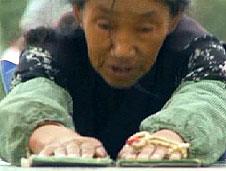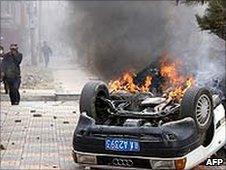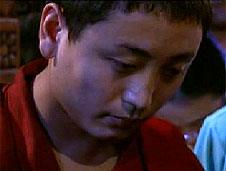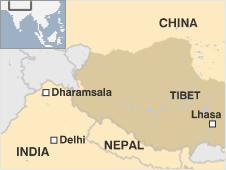No room to talk in 'stable' Tibet
- Published
BBC journalist taken on rare escorted visit to Tibet
The Potala Palace, once the seat of the Dalai Lama before he fled into exile, glows in the evening light.
Its huge red and white walls, rising above Lhasa, are spot-lit against the deep blue hues of the Tibetan sky.
Across the road, Chinese tourists throng a huge open square. Patriotic Han Chinese music, about developing the western reaches of China, blares from loudspeakers.
Giant fountains, lit up by neon lights, dance in time to the music.
Facing the Potala Palace is a huge outdoor television screen also blaring out sound. A few Tibetans wander the streets selling trinkets to the tourists.
Through the crowd passes a Tibetan pilgrim.

A pilgrim prostrates himself on the ground in front of the Potala Palace
He has wooden paddles attached to his hands. He uses them to prostrate himself on the ground in front of the Potala Palace, then stands up, takes three paces (the length of his lying body) and lies down again.
It is a traditional Tibetan form of pilgrimage, to travel the length of your journey lying down.
A complaint often voiced by Tibetans is that they believe that their traditional culture is being eroded by Chinese rule. Right in front of the Potala Palace the cultures seem to clash.
Controlled tour
For two years now Tibet has been largely closed to foreign media.
We were allowed in with a small group of journalists, escorted by Chinese minders.

The 2008 riots were the worst unrest in Tibet for 20 years
China's aim was to convince us that things are back to normal after the serious unrest that erupted across the Tibetan plateau just before the Olympics in 2008, and that the money China is investing to develop Tibet is transforming the place.
But ours was a highly controlled tour.
We had a set programme, minders watching us everywhere, and few opportunities to talk to Tibetans freely.
Everywhere we had a police escort, and we passed huge military convoys rumbling along the mountain roads. It gave the impression China is nervous about its hold on Tibet.
We were taken to the Tibet University, a group of modern buildings with the Chinese flag fluttering high above them.
But when we tried to stop some Tibetan students to talk to them security guards came running across, shoved between us, and shooed the students away.
At the Jokhang, Tibet's most important Buddhist temple, I was followed round by at least four plain-clothes security men.
It was near here that the riots broke out in 2008. Just after those riots another group of journalists were brought to the temple.
They were surrounded by monks who began shouting that there was no freedom in Tibet. It was a highly unusual protest against Chinese policies.
We asked what had happened to the monks, so one, a 29-year-old man called Norgye, was brought forward. This was not part of our carefully scripted tour.
His eyes downcast, Norgye looked shame-faced and deeply uncomfortable at our questions. He told us he had been through patriotic re-education and now saw the error of his ways.

Norgye told the BBC he had been through patriotic re-education
When asked what they had meant when they shouted there was no freedom, Norgye whispered in Tibetan to an older monk named Laba, the director of the temple's administrative office: "What should I say?"
The unconvincing answer, given for him, was that he had simply meant he had not had the freedom to go outside the temple during the unrest.
And patriotic re-education clearly had its limits. When we asked Norgye if he worshipped the Dalai Lama the young monk mumbled yes, but the official translator immediately told us he had said no.
'Love' for China
Outside the Jokhang, hundreds of Tibetans circled the temple, whirling their prayer wheels and prostrating themselves on the ground.
Chinese policemen, some armed with automatic weapons, marched through the crowds and manned checkpoints.
On the rooftops I could clearly make out marksmen watching the pilgrims and security cameras filming everything.
We were hurried on by our minders to meet Hao Peng, the vice chairman of the Tibet Autonomous Region.
He is Chinese and is one of the men entrusted by China's Communist Party with running Tibet. Tibetans, he insisted, were happy with their lot.
"All ethnic groups including Tibetans have benefited a lot from the progress and development that has happened in the 60 years since the peaceful liberation of Tibet," he said.
"People here know that they are now enjoying the best conditions they've ever had in Tibet. So local people love China, they love the Communist Party."
He claimed the heavy security in Lhasa was only necessary because forces outside Tibet, led by the Dalai Lama, were trying to stir up trouble.
"The Dalai Lama clique and some anti-China forces in the international community colluded to foment unrest in Tibet," he told us.
"That's why we have to take lots of measures to ensure there is stability here. So what you see in the streets, the police, the armed forces on duty, they are just what is necessary to maintain stability in Tibet."
We slipped out of our hotel at night into the darkness of Lhasa's alleyways, though plain-clothes security tried to follow us.

In the night Tibetans whispered that they were harassed by the security forces, that too many Han Chinese were flooding into Tibet, taking jobs from Tibetans, that they did not like the Chinese presence, and that they wanted to worship the Dalai Lama but had to do so in secret.
Above all it seemed there was fear, most Tibetans were too afraid to voice any criticism of China openly.
"In the past other people like you have come from outside Tibet and asked about things like politics and religion," one man told us nervously.
"Some Tibetans talked to them about those things. The police arrested the Tibetans and locked them up. So it's really not a good idea for me to talk to you on these subjects," he said.
Other Tibetans told us there were spies everywhere listening to everything.
China is pumping money into the region, hoping that raising Tibetan living standards, what it calls leap-frog development, will win over Tibetan support.
But it seems that fear and repression are at least as important in ensuring China keeps control in Tibet.
- Published3 July 2010
- Published25 June 2010